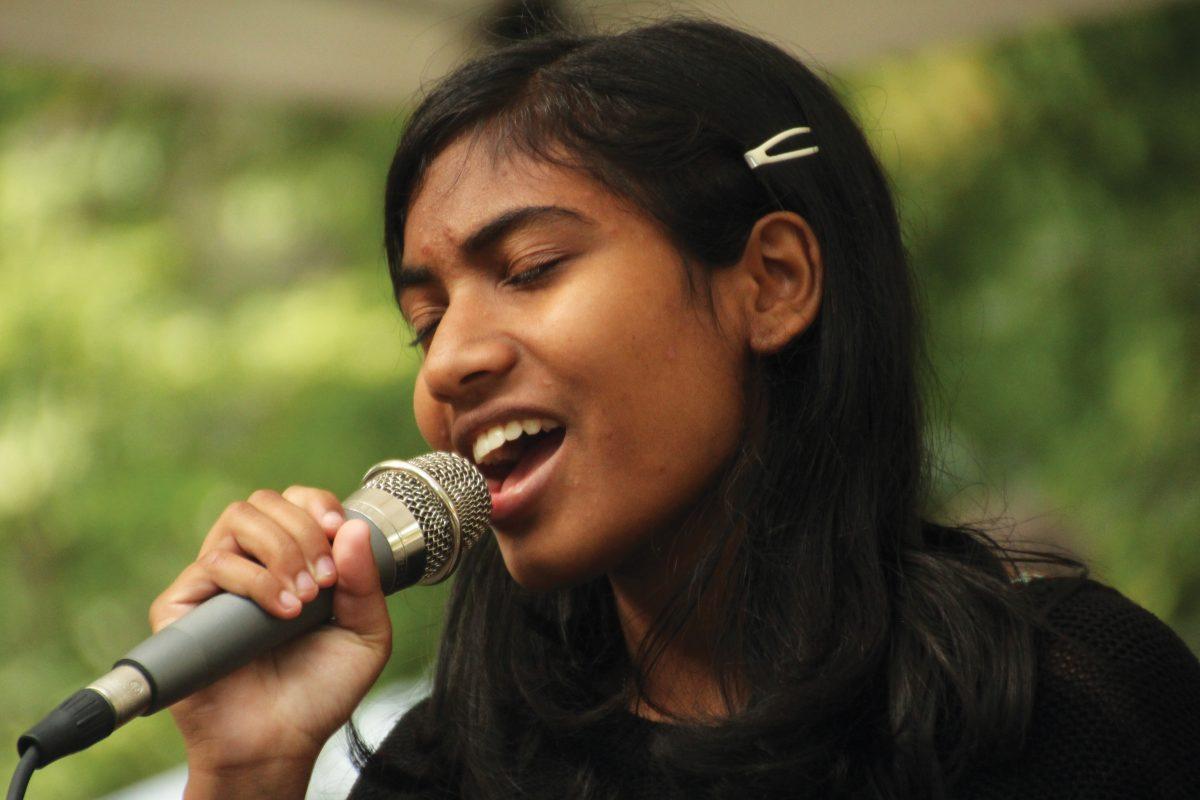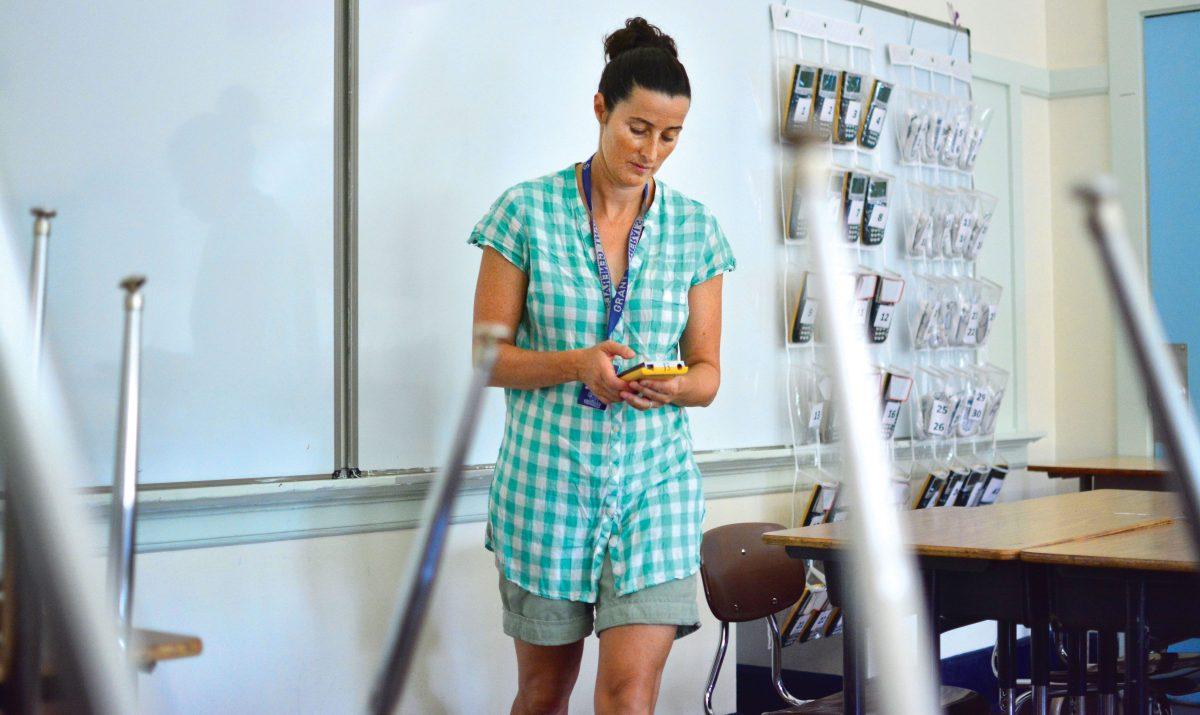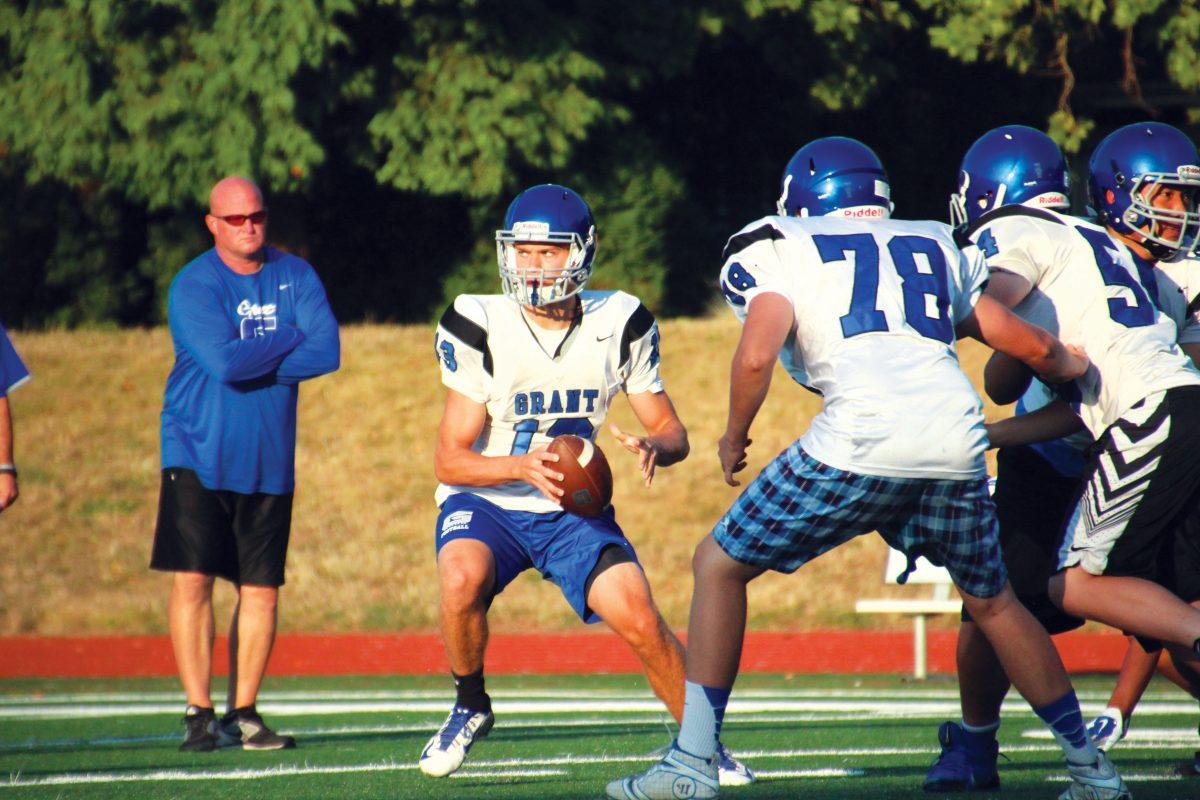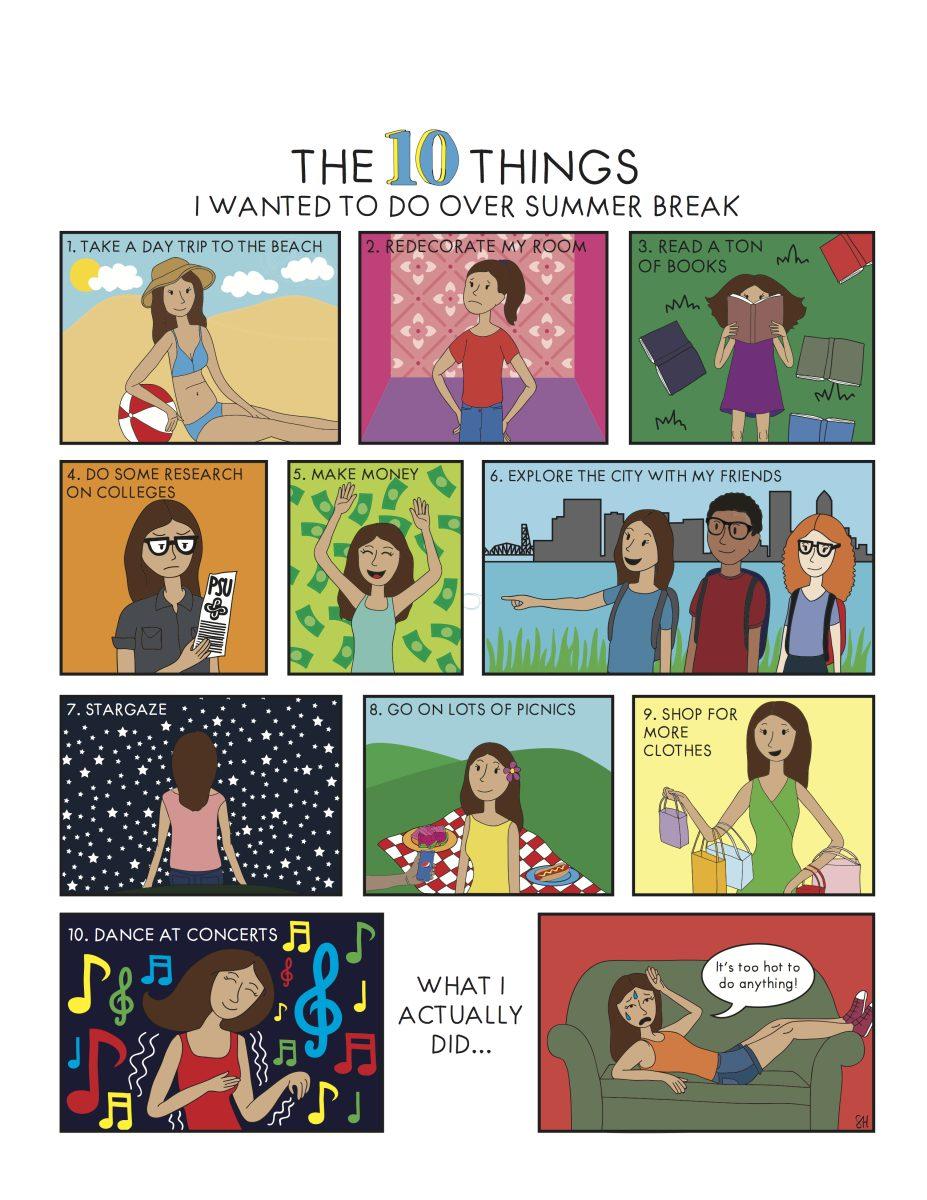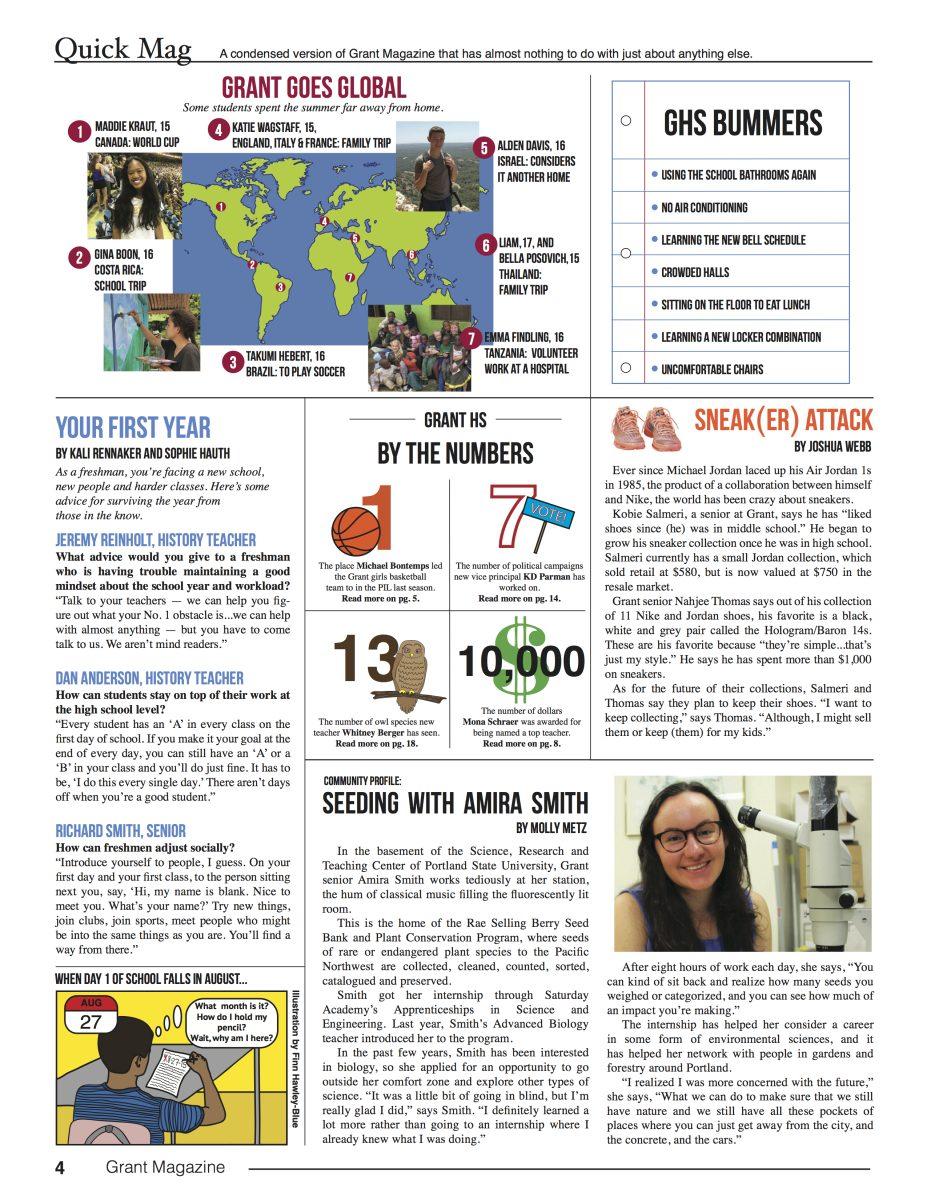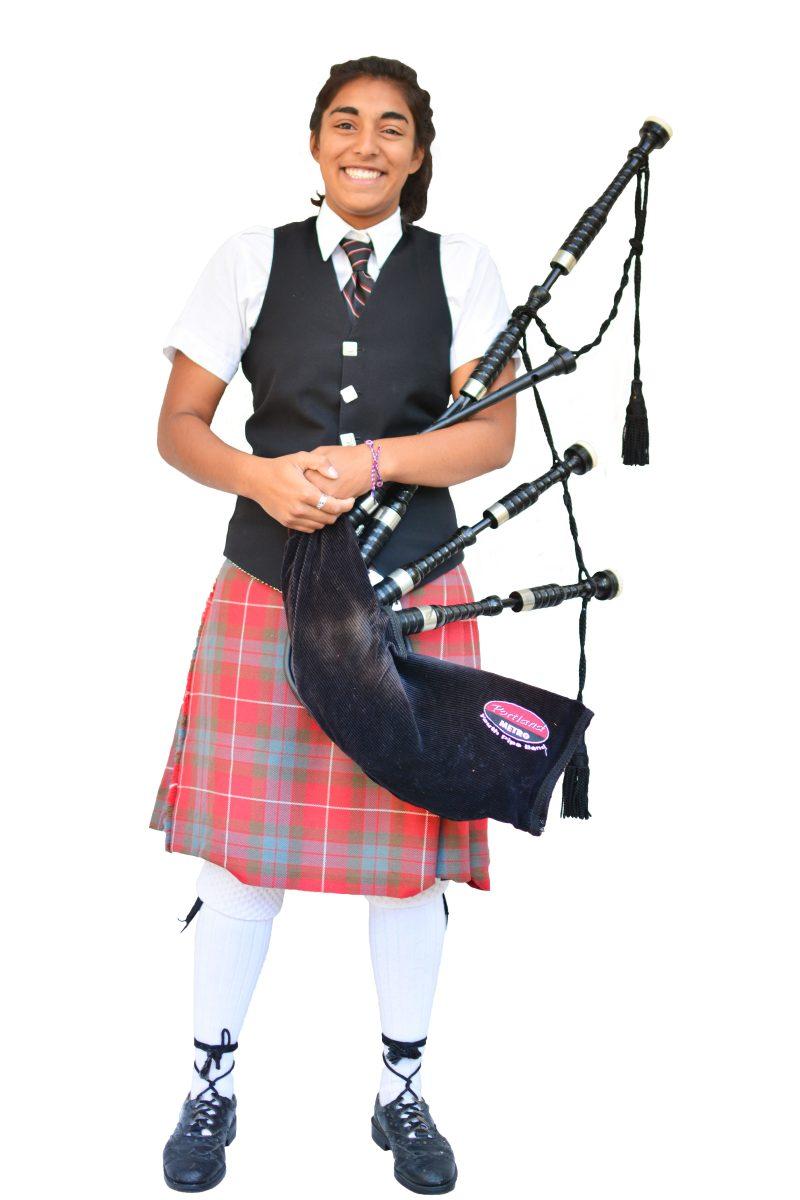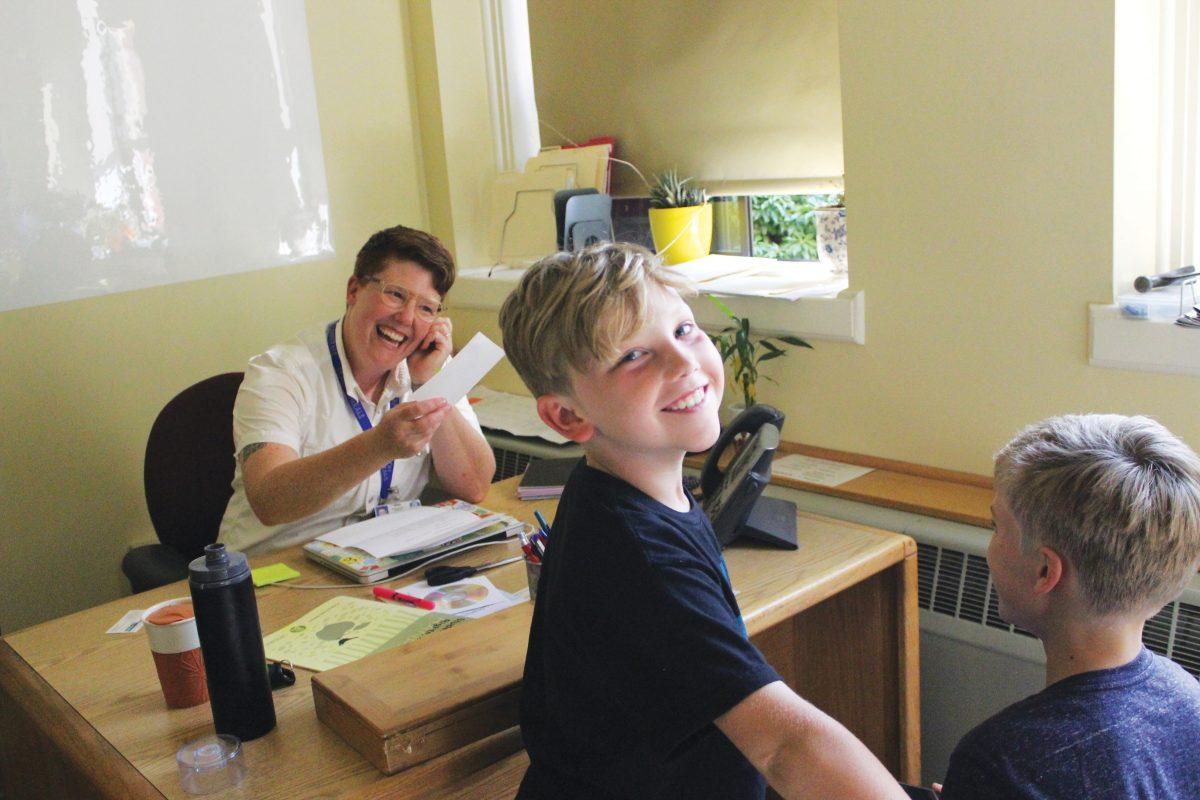On a recent Saturday morning, Grant sophomore Emilee Brnusak prepares for her performance at Portland State University’s Farmers Market. She sets up her computer, synced with all of her backtracks, adjusts her microphone and positions the speakers toward an eager audience. They don’t know her by her actual name but rather by her stage name, Emilee Rose.
In the crowd are two young girls, Lotus and Sage Spelling. They giggle with anticipation, pulling on their parents, Leah and Randy Spelling, as they whisper “Emilee Rose.”
The four are regulars at the market and have become some of Brnusak’s biggest fans.
“We were here just a couple of weeks ago and we sat up front and our girls loved her so much,” Leah Spelling says. “We have a little piano at home and for three weeks they’ve been saying, ‘Hi, I’m Emilee Rose and I’m going to play you this song.’ When we came today and saw her, they were so excited.”
On stage, Brnusak is a natural. She begins the hour long set with the Norah Jones song, “Don’t Know Why,” her signature. Brnusak’s deeply powerful voice is not something you’d expect from her 4-foot-10-inch frame.
While hundreds meander the surrounding vendors, the soulful sweetness of Brnusak’s voice draws a growing audience. Her mother, Karley, sits on a bench nearby, looking on as her daughter commands the stage.
If she’s nervous, you can’t tell. Every two or three songs, she stops to introduce herself. Grant sophomore. Singing since 13. Second runner-up in Portland Teen Idol. And yes, her trusty tip jar that reads “Help me get to college” does actually serve the purpose of helping her get where she wants to go.
By the end of her hour-long set, Brnusak has $110, half of which she will (reluctantly) put into savings at her mother’s insistence. Before she can pack up her microphone, she’s joined on stage by Lotus and Sage, who beg for an encore.
With a smile, Brnusak agrees. She begins to sing “Put Your Records On” by Corinne Bailey Rae as the young girls jump around the stage.
Brnusak is no stranger to the spotlight. She’s been involved in music her whole life, from the time she was a baby just adopted from India and singing incomprehensible jabber to participating in Portland Teen Idol, which she describes as “a less glamorous American Idol.”
For Brnusak, it’s an outlet.
Adopted at age one, Brnusak grew up with a lot of unanswered questions. She doesn’t dwell on her past but part of her will always wonder. Through music, Brnusak has come into her own.
She has a busy schedule, even outside of her regular gigs at farmers markets, private parties and other venues. But it’s hard to imagine her days without the presence of music.
“The big thing that makes me happy is the fans,” Brnusak says.
She was born Oct. 9, 1999, in Visakhapatnam, India. Her given name is Krupavathi, though she doesn’t know her birth surname, a common occurrence in closed adoptions.
Brnusak admits that her life would have been dangerously different had it not been for her adoption. She was born to an unmarried woman and in India that’s deadly. Brnusak, like 160 million other Indians, was an untouchable.
Being an untouchable in India’s de facto caste system means perpetual discrimination and exclusion from even the most basic rights, including access to education. Many untouchables, known as “Dalits,” end up homeless. Roughly 78 million of India’s citizens are living on the streets and of those, 11 million are under the age of 18.
In retrospect, Karley Brnusak admits that that very well may have been Emilee’s fate. “The life that she would have had would have been very different,” she says.
It took Karley Brnusak a year to decide whether she wanted to adopt. She worried about the commitment and the reaction that her family might have. When a friend adopted a young girl from China, Karley knew the time was right. She began the long and meticulous process of adopting from India. In October 2000, she traveled to New Delhi to bring her daughter home.
When Karley Brnusak first met her daughter, it was love at first sight. She knew instantly that the little girl who weighed less than 12 pounds at just more than a year old was her daughter. Though getting there to make the exchange wasn’t as she imagined.
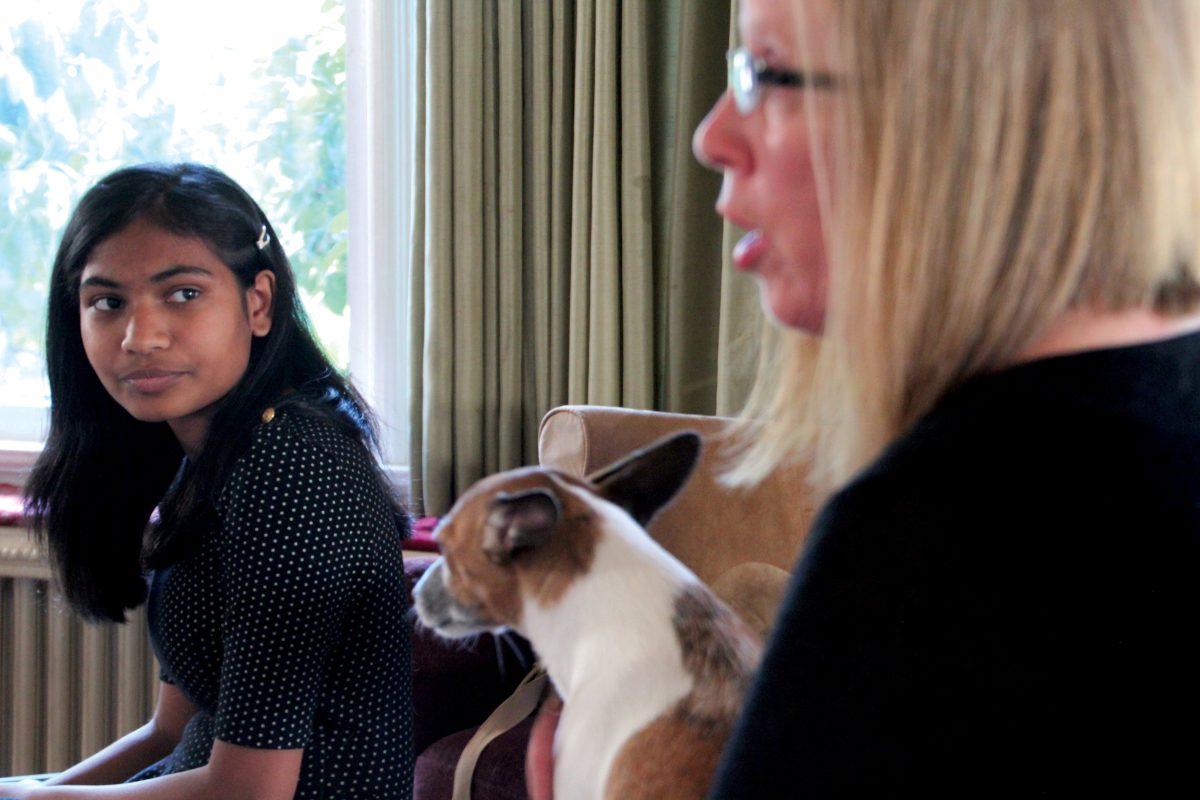
The language barrier made even the simplest of directions nearly impossible. All she had to do was call the orphanage’s director, Paparao Yeluchuri, to confirm that Emilee was in safe hands. “It was really hectic. It wasn’t how I had envisioned it. You kind of envision things being peaceful and relaxed but it wasn’t that way,” Karley Brnusak recalls.
After a couple more weeks in New Delhi, Karley Brnusak and her daughter were headed to their Northeast Portland home. It took Emilee Brnusak some time to adjust to her changing environment. White people were an entirely new concept to her. She was used to her Aya, or caregiver, and anyone else was a threat.
Inch by inch, Brnusak became more comfortable with her new family members who welcomed her with open arms.
“For years on end, it felt like I got presents everyday. At Christmas, you couldn’t even find me in all the gifts,” Brnusak laughs.
Her mother refrained from introducing her to anyone who would not remain in her daughter’s life, a precaution because abandonment issues in adopted children are common.
Growing up, Brnusak struggled with her Indian roots. Closed adoptions leave many questions unanswered and for a young Brnusak that was a difficult notion to wrap her head around. She often wondered why her biological mother gave her up and whether she was still alive. Because of the rules, Brnusak legally isn’t supposed to look for her biological mother.
“I’ll just have to wonder,” she shrugs.
Throughout her childhood, Brnusak and her mother took measures to make sure she wouldn’t lose touch with her culture. She took Bharata Natyam classes, a traditional folk dance in Indian culture. She also exchanged letters with Yeluchuri.
In elementary school, Brnusak collected bottles and cans, sending the deposits to Yeluchuri back in Kakinada. In fifth grade, she stepped it up and encouraged the entire grade to bring their bottles and cans to school. Together, they made more than $300 which Yeluchuri used to build a well near the orphanage.
For Brnusak, this is an important connection between her life then and now. She has also found solace in music. It wasn’t until eighth grade that she began to take things more seriously after stumbling upon a flyer for Portland Teen Idol.
In the past, she had been a part of vocal groups, including the choir at All Saints, where she went before transferring to Laurelhurst in second grade, and Shine Children’s Chorus.
The competition was held at venues across Portland during the summer of 2013. While Brnusak had gained years of performing experience in groups, Portland Teen Idol was her first solo performance. “I was really nervous before I went on and then I got up there and things eased up,” she remembers.
She sang “Mad World” and knocked it out of the ballpark, eventually earning a spot in the finals where she came in third. She toured greater Portland with the top finalists of Portland Teen Idol and soon, she was touring with The FANatics.
Reactions to her singing weren’t always positive.
While performing at PSU’s Farmers Market last summer, a homeless woman interrupted, yelling “Indians can’t sing.” Karley Brnusak ushered the woman away from the stage.
Today, Emilee Brnusak jokes about the incident. It was a shock but It isn’t the first time her ethnicity came under scrutiny.
She hears too often that people like her should know the answers to last night’s homework or listen to strictly Indian music. She recognizes the bewildering picture when she and her white mother walk down the street.
“The thing I get is when I see little kids and they know me,” she says. “They’ll always ask me why I’m brown and I don’t know what to say to them. I usually say ‘Because I can be.’”
Her composed nature comes, in part, from her years on stage. She hasn’t always been outspoken. But her love for performing and the talent she displays onstage have pushed her.
This year, Brnusak hopes to push herself even further on Grant’s Royal Blues. She’ll be joining as a sophomore, a rarity. But before the opportunity presented itself, she had no intention of actually joining.
“I was only going to audition for a Cappella,” she says of the group at Grant. “We have to fill out a sheet and it said, ‘Would you want to do Royal Blues?’ and I checked ‘No.’ Then I did my a Cappella audition and (music instructor John) Eisemann was like, ‘If you got a call-back for Royal Blues, would you come?’”
The performer in her naturally said yes but her nerves nearly got the best of her when she showed up for call-backs.
She won the judges over with her signature “Don’t Know Why” and Eisemann is excited to have her. “I have the utmost confidence in her ability and I’m really looking forward to working with her these next three years to help her become the best musician she can be,” he says.
As for the future, Brnusak wants to be an ultrasound technician before joining the FBI’s forensics division. While she has no plans to pursue singing as a career, it’s hard to imagine her life without it.
Brnusak and her mother have discussed taking a trip back to India in the near future but, for now, she’s content being in Portland. She wonders about her past and whether she has any siblings. “That’s something I want to know,” she says. “Am I the oldest? Do I have other siblings that are younger that I’ll just never know that are somewhere else out in the world?”



























